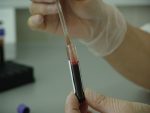
People who like working with various types of people daily would consider phlebotomy a rewarding career.
They will be able to help patients, while not having to devote too much time or money to start training.
Besides the fact that this is an entry-level career, you will not find a better option than many jobs with such a short period of training.
Of course, phlebotomy is not a career for everyone, but only for those who can handle being around blood and needles all the time.
If you wish, you can be a phlebotomist forever.
If you would like to proceed with your education and further your experience and knowledge, phlebotomy is an ideal starting point.
Those who are thinking about different jobs in the healthcare industry can only start with phlebotomy being that such a short training and level of experience is required and then start training for other career fields.
Page Navigation
- Why Choose a Career in Phlebotomy?
- It Doesn’t Take Long to Become a Phlebotomist
- Phlebotomists Are in Great Demand
- Where Can a Phlebotomist Work?
- Phlebotomy Pays Well
- Flexible Work Schedule
- Opportunities for Professional Growth
- Working with People
- Phlebotomists Are Well-Respected
- Travel and Volunteer Opportunities
- Every Day is Completely Different
- Help People Overcome Their Fears
Why Choose a Career in Phlebotomy?
Our aim with this guide was to explore both the benefits and disadvantages of choosing a career in phlebotomy.
It will cover what is expected of phlebotomists and what characteristics these professionals should have as a person.
We keep on saying that phlebotomy is an excellent career choice, but only for the right person.
If you really feel like you are the one, you can turn this job into a life-long career.
We will also mention some of the training programs for future phlebotomists.
It Doesn’t Take Long to Become a Phlebotomist
One of the most important reasons why people consider phlebotomy as a good career choice is that the training does not last too long.
Phlebotomy training takes less than a year, typically about 4-8 months.
How long it will last depends on the training facility that you choose to attend.
There is even the option of taking some phlebotomy classes online.
Besides the fact that not all states demand certification, our suggestion is to take the training to become a certified phlebotomist.
It is a good idea, as certified phlebotomists gain more experience, are more likely to get hired, and will get a higher salary than a non-certified phlebotomist.
No matter where you decide to attend phlebotomy training, it is split into two parts and during the first half of your training, you will learn:
- Lab safety rules
- Human anatomy and systems
- How to perform venipunctures
- Medical terminology
During the second half of your training, you are supposed to perform venipunctures.
You will be required to successfully draw blood from a large number of people to be allowed to successfully finish your training.
Hands-on experience is important as it proves to the employer that you know what you are supposed to do upon hiring and you can get hired anywhere.
The aim of the training is to prepare students for almost any situation a phlebotomist might face.
Phlebotomists Are in Great Demand
Finding a job in the healthcare industry can bring you a lot of security, being that there will always be the need for medical care.
Furthermore, the advancements in technology have made healthcare professionals able to discover conditions much better than ever before, which is also the case with phlebotomy.
Being that so many conditions and diseases can be diagnosed with a blood sample, phlebotomists are in great need.
There is a lack of professionals who are well trained to draw blood from patients, and the population is getting older.
The baby boomer generation will need more and more blood tests as they continue to age.
Having all these in mind, phlebotomy is definitely a job to consider for the future.
According to the Bureau of Labor Statistics, the job growth by 2026 will be/ 25%, which is much above the national average for other jobs.
Due to the great need for qualified phlebotomists, you should not be worried about getting hired quickly upon finishing your training.
Where Can a Phlebotomist Work?
We have already mentioned that phlebotomists are heavily needed in many organizations and facilities, so you should not worry about your employment upon finishing the training,
You should know where you might be able to work as there are many opportunities.
Working in a hospital is the first place that you may think about.
You can find employment in busy hospitals all over the country that are in constant need of several phlebotomists.
If you get your job there, you will be the first person a patient sees.
In hospitals, phlebotomists not only work with patients, but as a part of a team of doctors, lab techs, and more.
A hospital is not the only place where a phlebotomist can work, as there are other locations, as well.
Some of the places include:
- Emergency clinics
- Private practices
- Red Cross/local blood banks
- Nursing homes
Opportunities to find work are numerous, as you could see, so you should only do a quick search online and find places looking for phlebotomists near you.
You should always choose a place that suits you best.
Phlebotomy Pays Well
As we have already mentioned, the reasons for becoming a phlebotomist are numerous, and one of them is that you will get a decent salary.
Phlebotomy is an entry-level job, and you cannot expect to make a fortune, but you will not be able to get better-paid jobs for such a short period of training.
This is a job that takes less than a year to train for, which is also not expensive, while on the other hand offers a comfortable salary.
On average, a phlebotomist earns around $33,000 per year.
Those who work full-time in a hospital and clinic get benefits like insurance.
If you compare this to the fact that training programs cost no more than $4000, you can conclude that you do not need the fortune to start your career as a phlebotomist, but you will be getting a decent salary.
High demand for phlebotomists forces medical facilities and other organizations to pay more for qualified phlebotomists.
Some hospitals even provide training if these trainees accept to work there afterward.
Becoming certified is another option that will bring you a higher salary from the start.
As a certified phlebotomist, you can even negotiate for more before getting hired.
Flexible Work Schedule
Phlebotomy is known as a profession that offers a flexible schedule, but this highly depends on where you choose to work.
People who work in a busy hospital will be required to work overnight hours and never have a typical 9-5 shift.
A 9 to 5 job can be found in a private practice that typically works during standard business hours.
Many phlebotomists work part-time, especially if they need extra time off to be able to get additional education and training.
You can also choose to become a mobile/traveling phlebotomist and determine when you want to work.
It is similar to freelancing, being that mobile phlebotomists are hired by different groups or medical facilities when they need them.
These facilities use mobile phlebotomists in case they do not need one on staff every day, or they cannot afford it, but sometimes are in need of him/her.
Typically, blood drives, busy hospitals, and nursing homes use mobile phlebotomists.
The only disadvantage of this option is that you need to build up a client base, which might be difficult at the very beginning.
Opportunities for Professional Growth
If you are familiar with the fact that phlebotomy pays higher salaries than many other entry-level jobs, that is another reason to consider it as your future profession.
Another great thing about phlebotomy is that it is an excellent career choice that offers many opportunities for growth.
You can either choose to remain a phlebotomist for the entire life or take advantage of various promotions.
On the other hand, phlebotomy can only be a stepping stone for you which will lead you to a different medical career path.
All this depends on the number of certifications you get.
How high you can take your phlebotomy career will be based on your preferences and abilities, as some types of phlebotomists need extra training, such as a therapeutic phlebotomist.
The more training you get, the higher salary you can expect.
If additional training is not your interest, then there are higher positions for phlebotomists, which can be reached after years of experience.
You can become a supervisor and also get a pay raise.
A supervisor is a person who needs to make sure that a phlebotomy team is perfectly doing its job and that everything in the facility runs smoothly.
For some people, phlebotomy is just a way into the medical field.
The reasons for this are numerous, such as not being able to afford medical school or spend years without working.
These individuals start off as phlebotomists, and being that their schedule is quite flexible, they can take additional classes.
Specialists, nurses, and even many doctors started as phlebotomists.
Working with People
Phlebotomy is never considered a ‘boring’ career, due to the fact that phlebotomists have to work with different people every day, both patients and staff.
How many people you will see per day depends on where you choose to work.
In some facilities, you can see dozens of patients, that will be of different character and age, ranging from small children to senior citizens.
It is also possible to work only with a specific group, but this can narrow your employment options.
Those who want to work with senior citizens only should look for a job in a nursing home.
A phlebotomy career is for those individuals who enjoy the conversational part of healthcare.
A good phlebotomist is the one who is ready to interact with his/her patients so as to make them feel as comfortable as possible.
Phlebotomists Are Well-Respected
We keep on mentioning that phlebotomy is an entry-level career, but this does not make it less important than some other health-related careers.
Phlebotomists are significant in any medical facility, as they do work that is essential to the medical field.
Blood tests are done so as to save lives and diagnose medical conditions.
These are just some of the conditions that can be discovered with a simple blood test:
- Allergies
- STDs
- Anemia
- Infections
- Leukemia
- Prostate cancer
Blood tests are an efficient way of determining genetic markers and thyroid disorders.
The advancements in technology make blood tests able to determine more than ever.
Due to the fact that blood tests are a vital resource in the healthcare system, phlebotomists are definitely well-respected members of a medical team.
Travel and Volunteer Opportunities
Many people think that if they do not attend medical school for years, they cannot be an important part of the medical community.
They are wrong, as phlebotomists are needed all around the world.
You can always choose to take advantage of volunteer opportunities for phlebotomists in numerous facilities in the United States.
Those who are eager to travel and work, while at the same time helping people around the world can become travel phlebotomists.
Different organizations are in constant need of phlebotomists all over the world, especially in those locations which do not have access to medical care.
Every Day is Completely Different
Do not think that your job as a phlebotomist would be routine work.
It is a fact that you will be doing the same job every day, every day will be completely different, in terms that you will be dealing with different people and each patient you see will keep things interesting.
However, this is not the only part that makes the job exciting.
Your working environment can be quite busy and you should expect to be on your feet for a long time.
Also, phlebotomists must be able to move quickly and help the patient, as they are typically the first person a patient meets in a hospital or clinic.
The more important the case is, the greater boost of adrenaline it will give you.
Some phlebotomists will work with medical labs, taking the blood samples to these labs a few times a day.
If you do not find yourself able to deal with different conditions, maybe a phlebotomy career is not the right one for you.
Many diseases can be found with a blood test.
Also, those who value routine and want a slow-paced job should not consider the phlebotomy profession.
Help People Overcome Their Fears
The personal characteristics that a good phlebotomist must have are numerous, as he/she does not only draw blood and label it during his/her daily work.
A phlebotomist has to enjoy working with people, being that they need to be patient and understanding with their patients.
They should never allow that patients experience bad blood draws, such as painful sticks or having to get stuck many times.
So, each future phlebotomist has to strive towards being great at what he/she does.
It is true that the medical field needs more phlebotomists, but those should be great phlebotomists who will not scare people.
In case a patient does not feel relaxed when coming to a medical facility, he/she might not be willing to get the blood drawn, which unfortunately results in undiagnosed and untreated conditions.
A great phlebotomist needs to be kind and make sure patients know that there is nothing to worry about during a blood draw.
Who Should Become a Phlebotomist?
You might be wondering whether phlebotomy is a good career choice for you.
Once you read our article, you will be able to determine if the requirements and characteristics needed to become a phlebotomist suit you.
You need to know that it takes a particular type of person to be a skilled phlebotomist and if you possess these qualities, they can make you enjoy this career more.
Qualities that a phlebotomist should have include:
- People skills
- Ability to be part of a team
- Ability to stand on your feet for hours at a time
- Attention to detail
- Highly-organized
- Not squeamish about blood
- Patient
- Compassionate
While phlebotomy is an entry-level job, it’s still a medical career.
You need to understand that people who come to see you can be nervous or scared, and feel uncomfortable.
And, your main task will be to help them relax.
In conclusion, getting into this career just because of the short training time and decent salary is not the right way of thinking.
Disadvantages of a Career in Phlebotomy
Up to now, we have only spoken about the significant benefits of becoming a phlebotomist.
But, it is necessary to mention that among so many advantages there are also some drawbacks.
Before you make a decision whether this job is perfect for you, you should get familiar with some of the disadvantages of a phlebotomy career.
Here are some of the problems with phlebotomy:
- Risks: This is not a high-risk position, but certain risky situations can happen to a phlebotomist. Airborne contaminants could be around him/her and he/she can accidentally be stuck with a needle. In case the needle is contaminated, there is a risk for a disease. As they are constantly working with blood, risk factors are numerous, and knowing how to handle every single tool with great care is obligatory and crucial when it comes to phlebotomists’ safety. furthermore, the worse situation is injuring a patient. This can cause various consequences, such as losing your job or putting the medical facility into a lot of trouble.
- Long hours: Phlebotomy typically involves long hours spend on your feet. Walk many steps from and to the lab in a busy hospital is also part of your daily activities. So, people with foot or leg problems should not consider phlebotomy as the right choice.
- Stressful work environment: We have already said that there are many different places a phlebotomist can find employment and working in a stressful environment of a hospital is not everyone’s cup of tea. Some phlebotomists prefer a peaceful working environment and this can also be considered a drawback. You need to know that things in a hospital move at a fast pace, and it is sometimes impossible to have a break. However, you will not do your best if you feel stressed at work which can lead you to quit the job.
- Difficult patients: This is what many phlebotomists find troublesome as they need to work with different types of people. If you are a person who does not get stressed when dealing with difficult people, that would be your massive benefit. It is important for phlebotomists to understand that certain patients are not pleasant to work with and the only solution to this situation is to remain even-tempered.
- Seeing difficult situations: It is a frequent occurrence in emergency clinics or hospitals. Phlebotomists are exposed to a lot of injuries and conditions, so they need to be ready to see everything. They need to be prepared well for these emergency situations, as some of the patients could be children.
After reading all these facts, you may change your mind, but the most important thing to remember is that if you choose to become a phlebotomist, you will be helping a lot of people and that is the greatest side of this profession.








